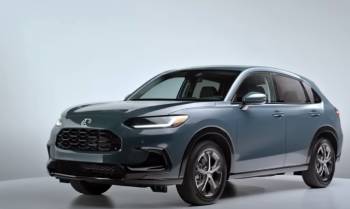Choosing between Honda’s legendary Civic and the rugged HR-V can be like picking your favorite child. Both come from the same reputable family, yet each brings its unique personality to the table.
If you’re in a pickle trying to decide between the two, let’s break things down, step by step.
A Brief Comparison Table
| Feature/Aspect | Honda Civic | Honda HR-V |
| Vehicle Type | Sedan/Hatchback | Compact SUV |
| Design | Sleek, Sporty, Low Stance | Bulkier, Versatile, Higher Ground Clearance |
| Interior Space | Ample for passengers, limited cargo | “Magic Seat”, versatile cargo options |
| Performance | Sporty, agile, powerful variants available | Smooth, optional AWD |
| Fuel Efficiency | Typically higher mpg | Good for an SUV, slightly lower than Civic |
| Safety Features | Low design, Honda Sensing, better maneuverability | Better visibility, Honda Sensing, optional AWD |
| Price Range | Generally lower | Higher due to SUV features |

The Honda Civic: An Icon Reborn
The Civic has been around for decades, making it Honda’s longest-running and perhaps most iconic model.
It’s seen countless iterations but has consistently remained at the top of the compact car segment.
Pros of Honda Civic:
- Fuel Efficiency:
The Civic’s lean body and engine configurations ensure you’re not visiting the fuel station too frequently.
- Sporty Feel:
Especially with the Si and Type R models, driving enthusiasts get a real kick out of the Civic.
- Safety:
The Civic’s safety tech, part of Honda Sensing Suite, has received praises across the board.
- Resale Value:
Historically, the Civic holds its value pretty well over the years.
Cons of Honda Civic:
- Space:
Being a compact car, those frequently traveling with a family or requiring more cargo space might find it a bit crunched.
- Ground Clearance:
For roads that aren’t as forgiving, the Civic’s low stance might not be ideal.
Also Read: Is Having AAA Tire And Wheel Insurance Wise?
The Honda HR-V: Compact SUV Magic

The HR-V is Honda’s foray into the compact SUV market.
It’s sporty, practical, and rugged – designed for those who love the Honda brand but need something a little more versatile.
Pros of Honda HR-V:
- Versatility:
Thanks to the Magic Seat feature, the HR-V provides numerous configurations to suit your cargo needs.
- Higher Stance:
For rough terrains or pothole-ridden city streets, the HR-V offers better ground clearance.
- Fuel Efficiency:
For an SUV, the HR-V boasts impressive mileage numbers.
- All-Wheel Drive:
Available as an option, it’s great for those in trickier climates or who enjoy off-roading.
Cons of Honda HR-V:
- Engine Power:
Some users feel the HR-V could do with a bit more punch under the hood.
- Infotainment System:
A few users have mentioned that the system feels a tad outdated compared to competitors.
Which One’s for You?
It truly boils down to your specific needs:
- For the City Slicker: If you’re predominantly city-bound and love a car that’s easy to park, the Civic is your go-to.
- For the Adventurous Soul: If you frequently find yourself on varied terrains, or just need that extra space, the HR-V won’t disappoint.
Key Differences Between Honda Civic and Honda HR-V
Honda’s diverse lineup caters to a variety of customers, with each model engineered to meet specific needs. Both the Honda Civic and Honda HR-V are brilliant in their domains, but they cater to different segments of the market. Let’s dive deep into the key differences that set them apart.
- Vehicle Type & Design
Honda Civic:
It’s a sedan (though there’s also a hatchback variant), designed primarily for urban driving.
With its sleek design, low stance, and aerodynamic build, the Civic leans towards a sportier feel. It reflects a compact yet aggressive design, made to handle city roads and highways with equal ease.
Honda HR-V:
On the other hand, the HR-V is a compact SUV. It’s higher, bulkier, and designed with versatility in mind.
The HR-V is suitable for city driving but also has the added advantage of performing well on rough terrains, thanks to its higher ground clearance.
- Interior Space & Comfort
Honda Civic:
Being a compact sedan/hatchback, the Civic provides ample legroom and comfort for passengers but might not offer as much cargo space as SUVs.
Its rear seats can fold, but the configuration options are more limited.
Honda HR-V:
The HR-V shines in this department. Honda’s “Magic Seat” offers multiple configurations, from Utility Mode (maximum cargo space) to Tall Mode (floor space) to Long Mode (long items).
It provides the flexibility to haul larger items, something the Civic can’t rival.
- Performance & Handling
Honda Civic:
Traditionally, the Civic offers a more agile and sporty driving experience. The lower center of gravity gives it better handling and cornering abilities.
With variants like the Si and Type R, the Civic can deliver impressive power and performance, making it a favorite among enthusiasts.
Honda HR-V:
While the HR-V does offer a smooth driving experience, it might not have the same sporty feel as the Civic.
However, the available All-Wheel Drive (AWD) option provides better traction on difficult terrains, which the Civic lacks.
- Fuel Efficiency
Honda Civic:
Compact cars like the Civic tend to have better fuel efficiency.
Their smaller size and weight, combined with efficient engine configurations, ensure that they deliver impressive miles-per-gallon (mpg) figures.
Honda HR-V:
For an SUV, the HR-V offers commendable fuel efficiency.
However, due to its larger size and weight, it might not match the Civic’s mpg figures. But considering it’s an SUV, it still stands out in its category.
- Safety Features
Both vehicles come equipped with Honda Sensing, Honda’s suite of safety and driver-assistive technologies.
However, their designs can influence the effectiveness of certain features.
Honda Civic:
Its low design ensures stability, reducing the chances of rollovers. Plus, its compact size allows for easier maneuverability in tight situations.
Honda HR-V:
The HR-V, being taller, offers better visibility, especially in heavy traffic. Additionally, its AWD option can offer better grip on slippery roads, enhancing safety.
- Pricing
Honda Civic:
Traditionally, sedans and hatchbacks like the Civic are priced lower than SUVs. The Civic offers excellent value for its price, especially considering its features and performance.
Honda HR-V:
Being an SUV, the HR-V usually comes at a premium compared to the Civic. However, the price increase is justified by the added space, versatility, and the potential for AWD.
Also Read: Differences Between Woodside Credit And LightStream Car Loan.
Frequently Asked Questions (FAQs)
With regular maintenance and care, a Honda HR-V can easily last over 200,000 miles. Honda, as a brand, is known for its durability and longevity.
Toyota’s counterpart to the Honda HR-V is the Toyota C-HR, which is its compact crossover SUV offering.
HR-V stands for “Hi-rider Revolutionary Vehicle.”
The 2019 HR-V received high praise due to its added features and refinements, making it a favorite among many. However, personal preference plays a role here, and updates in subsequent years may offer improvements.
HR-V stands for “Hi-rider Revolutionary Vehicle.”
The Honda CR-V is generally more expensive than the HR-V as it’s larger and offers more features, classifying it in the mid-size SUV category, whereas the HR-V is a compact SUV.
Conclusion
In the battle between Honda Civic and HR-V, there’s no clear winner. Both have their merits. Your choice hinges on what you prioritize more – the compact agility of the Civic or the rugged versatility of the HR-V. Either way, you’re in for a treat.
Remember, the best vehicle between the Civic and the HR-V depends on your needs. If you prioritize sportiness, agility, and fuel efficiency, the Civic might be your pick. If you lean towards space, versatility, and rough terrain capabilities, the HR-V could be the one.



